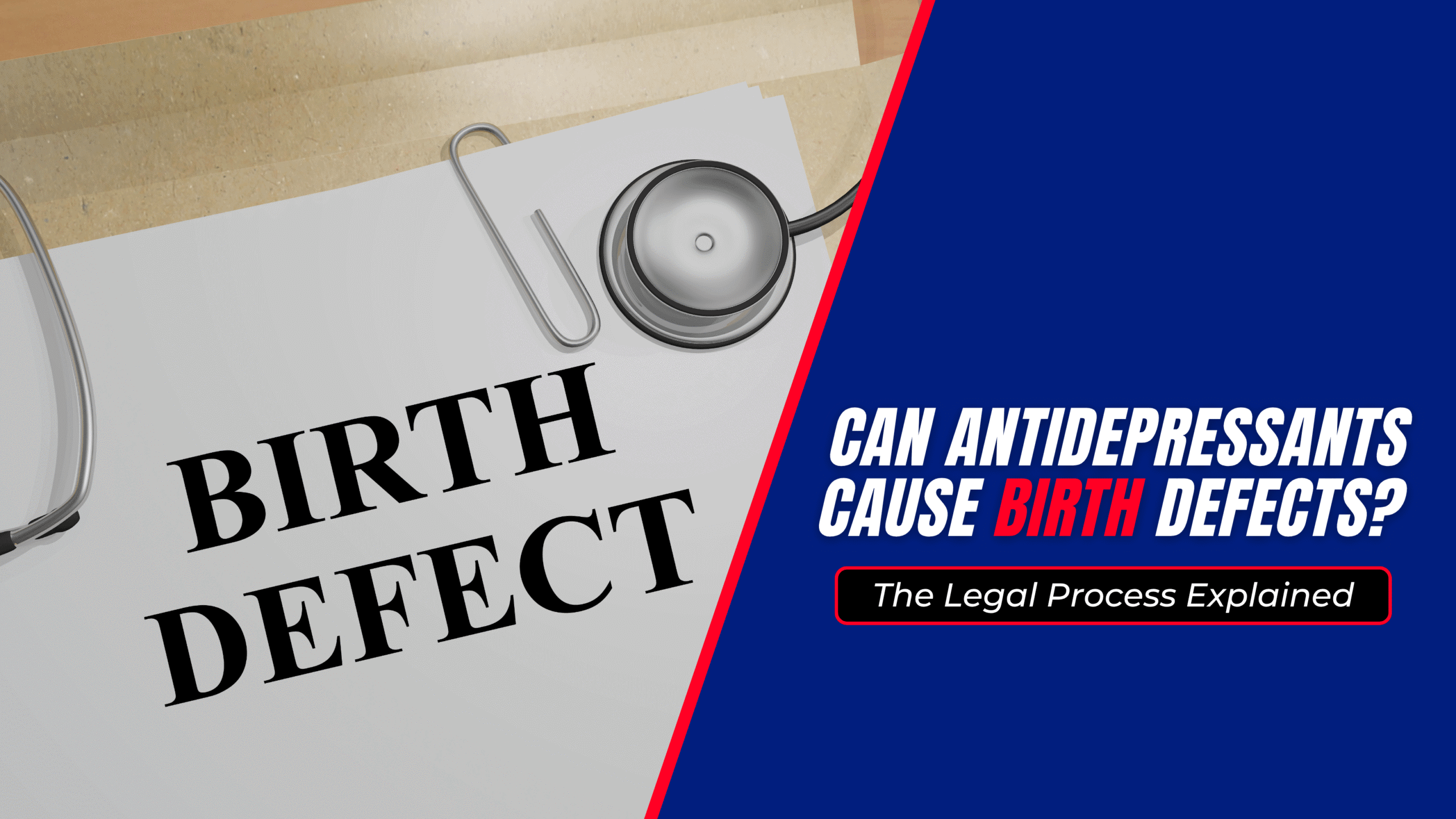A Closer Look at the Link Between Antidepressants and Birth Defects
Legally Reviewed and Edited by: Terry Cochran

75% of women with maternal mental health issues do not seek treatment, increasing the risks of preterm birth, low birth weight, and other health issues. To counter these risks, women may opt for antidepressants.
But that doesn’t protect their children either. To make the right choice, they need accurate information from manufacturers about the link between certain antidepressants and birth defects. When this information is inadequate or missing, you can sue the healthcare provider of the antidepressant manufacturer for damages if your child suffers a birth defect.
So, if you believe your child was harmed by your antidepressant use during pregnancy, contact our birth defect attorney to help you navigate your legal options.
Common Birth Defects Due to Antidepressant Use
Ingredients in certain antidepressants, such as SSRIs, disrupt the normal development of your baby’s organs, resulting in birth defects such as:
Anencephaly
Mothers who take SSRIs are at a higher risk of having children with anencephaly. Anencephaly is a fatal neural tube birth defect. Children born with this condition often die within hours or days of their birth as they lack part of the brain or skull.
Congenital Heart Defects
Using antidepressants when pregnant can cause congenital heart defects. Some of these defects can manifest as minor heart issues or severe heart malformations that need multiple surgeries and ongoing medical care.
Craniosynostosis
An infant’s skull remains flexible after birth to allow for further brain growth. However, some infants are born with craniosynostosis, a condition in which the fibrous joints of the skull close prematurely before the brain is fully developed.
The condition can result in a misshapen head, which may be evident during birth. Although this condition can be corrected with surgery, early detection and treatment are key in preventing developmental delays.
Gastroschisis
Mothers who take antidepressants in the first trimester are at a greater risk of having children with gastroschisis. Children with this condition are born with their intestines protruding through a hole in the abdominal wall, close to the belly button. While the condition can be corrected with surgery, it could result in long-term issues with digestion and bowel movements.
Health Risks of Antidepressant Use During Pregnancy
Using antidepressants during pregnancy can also increase the risk of complications such as premature birth and associated health risks to the baby. These include:
Premature Birth
Women who take antidepressants during pregnancy are at a higher risk of premature birth. Infants born before the 37th week of pregnancy risk developing additional health complications such as decreased immunity, an inability to maintain body temperature, and underdeveloped lungs.
Digestive Disorders
Babies who were exposed to antidepressants in the uterus are likely to develop digestive disorders such as gastroesophageal reflux and necrotizing enterocolitis. These conditions can lead to long-term issues with nutrition and health, as well as incur substantial medical bills for ongoing care.
Respiratory Distress Syndrome
Babies born prematurely are likely to have underdeveloped lungs, resulting in respiratory distress syndrome (RDS). Babies born with this condition cannot breathe on their own and need oxygen therapy or mechanical ventilation to support their breathing. Some babies also develop long-term respiratory issues, requiring ongoing medical care.
Filing a Birth Defects Claim in Michigan
You can file a medical malpractice or product liability claim if you believe that your child developed a birth defect due to your use of antidepressants during pregnancy.
You can file a malpractice claim against your healthcare provider if they were aware of the risks of antidepressants and birth defects, yet failed to warn you. Although leaving your depression untreated is not a suitable option, your healthcare provider has the duty to ensure your safety and informed consent.
You can file a medical malpractice claim against your doctor if:
- They failed to inform you about the risks of taking antidepressants during pregnancy
- They prescribed antidepressants without considering safer alternatives for treating depression during pregnancy
- They failed to monitor your pregnancy appropriately after prescribing antidepressants
- They continued prescribing antidepressants despite known pregnancy risks or after discovering you were pregnant
- They failed to refer you to a specialist when antidepressant safety in pregnancy became a concern
You can also file a product liability suit against the drug manufacturers. Several antidepressant manufacturers have been involved in class action lawsuits over claims of failing to inform pregnant women and healthcare providers about the risks of antidepressants and birth defects.
Pharmaceutical companies have a legal obligation to provide clear and adequate warnings about the potential risks associated with their medications.
If manufacturers knew or should have known about the connection between their antidepressants and birth defects but failed to warn healthcare providers and patients, they may be held liable for resulting injuries.
When pursuing a product liability claim, you’ll need to demonstrate that the pharmaceutical company failed to provide adequate warnings about the antidepressants’ effects on baby development.
This may involve showing that the manufacturer had access to research data indicating increased birth defect risks but chose not to update their warning labels or inform the medical community about these dangers.
Whether you’re filing a product liability suit or a medical malpractice claim, you must file within the statute of limitations. For medical malpractice claims, you have two years from the date you discovered the injury and three years for product liability claims to file your lawsuit.
Find a Birth Defects Attorney Near Me
If you or someone you love has a child diagnosed with a birth injury that may be due to medical negligence, get the legal representation you need. Speak with our compassionate, knowledgeable Cochran, Kroll, & Associates, P.C. attorneys.
At Cochran, Kroll Associates, P.C., we are experienced attorneys specializing in personal injury and medical malpractice cases. Senior partner Eileen Kroll is a registered nurse and uses her healthcare knowledge to interpret medical records as a nurse attorney.
We can review your case, guide you through the cerebral palsy claims process, and help you understand your rights and legal options. Contact us today for a free, no-obligation consultation. Our contingency fee basis means we only get paid if we win your case, so there is no financial risk to you to get started. Call our law firm today at 1-866-642-4529 and schedule your no-obligation, free case evaluation.
Disclaimer : The information provided is general and not for legal advice. The blogs are not intended to provide legal counsel and no attorney-client relationship is created nor intended.




